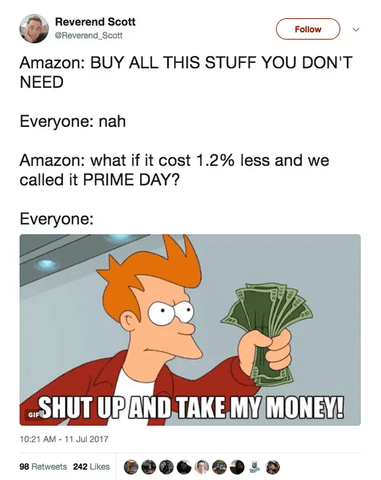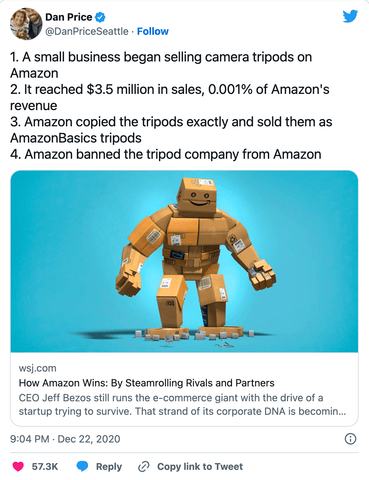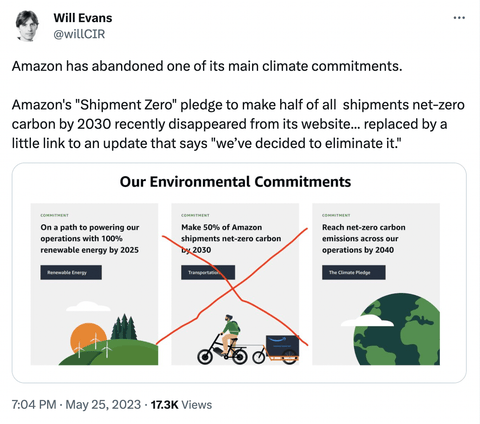Tomorrow marks a significant day in the shopping calendar:
Amazon Prime Day.
First started on 15 July 2015, to mark Amazon’s 20th birthday, Prime Day is scheduled for 11-12 July this year. It is a special shopping event for Amazon’s Prime members, featuring all kinds of sales and discounts, and personalised offers. This is essentially the online marketplace giant’s attempt at creating a second annual “Black Friday” at the other end of the year – but this one synonymous with their own brand name.
Here at Alvio, our whole model is built around empowering small businesses. We are firm believers in innovation, entrepreneurship and collaboration –
We believe that teams are ultimately more powerful than monopolies.
So this week, we thought we’d get into the festive spirit – by sharing a few of our own thoughts about Amazon, a company whose approach to business represents everything we stand against.

The Gazelle Project
Here’s a brief case study on how ecommerce monopolies operate.
In 2013, author Brad Stone released his book about Amazon, called The Everything Store. It doesn’t paint a pretty picture of the company’s business tactics – with Stone going so far as to call them “sadistic.” Particularly in the early days, when Amazon was competing against small book publishers, the Amazon model offered exciting distribution possibilities, but as soon as publishers started to become dependent on them for sales, that’s when Amazon would begin to apply pressure. Those who didn’t “pay to play” – offering Amazon the favourable discounts and longer pay periods they demanded – could soon discover that their books were becoming very difficult to find on the marketplace.
According to the New York Times, CEO Jeff Bezos is reported to have said that Amazon “should approach these small publishers the way a cheetah would pursue a sickly gazelle.” The operation to squash competition in the publishing business subsequently became known internally as “the Gazelle Project” – until Amazon’s lawyers stepped in and renamed it to the more innocuous title of “Small Publishers Negotiation Program.”
Brad Stone writes in his book that one Amazon executive, working in Europe, “took an almost sadistic delight in pressuring book publishers to give Amazon more favourable financial terms.” If these publishers didn’t give Amazon the terms they wanted, then the marketplace would raise the price of their books or promote competing titles until they gave in. (This directive, originally referred to as the “Pay to Play” programme, was later renamed by Amazon’s lawyers to “Vendor Realignment.”)
The Copycat Market
In 2020, the Wall Street Journal ran an article titled: “How Amazon Wins: By Steamrolling Rivals and Partners.”
It illustrated the case of a small company with a big idea (exactly the kind of company we like to partner with!), who set out to make the perfect camera tripod for a general audience – lightweight, affordable, travel-friendly but still capable of delivering great results. The product was a massive success: it hit just the right balance and sales were terrific, before long topping $3.5 million.
Amazon noticed this success story on their platform. The tripods were already making the marketplace money, but the company who created them were taking even more. And so Amazon produced its own version, an exact copy of the tripod design, which it put out under the “AmazonBasics” label. After that they removed the original supplier from the marketplace, and took over that revenue stream for themselves.

This story about the tripod company was widely shared, but it’s far from being a one-off occurrence. In a 2019 article titled “Is Amazon Unstoppable?,” The New Yorker reported that “Hundreds of other companies have told Amazon about counterfeiting or what they see as unfair competition – some of it generated by Amazon itself.”
They cite the example of Rain Design, a San Francisco company whose popular design for an aluminium laptop stand became a big seller on the marketplace platform… until it was replaced with a near-identical design put out under the AmazonBasics label for half the price. In 2018, another company – Williams-Sonoma – started a lawsuit against Amazon for a similar case of product duplication, this time an original chair design, making the claim that “Amazon has unfairly and deceptively engaged in a widespread campaign of copying.”
These days, Amazon doesn’t even need to wait for a product to succeed before it copies it. Many experts and critics claim that Amazon is using incredibly detailed user data to accurately predict which items are set to become bestsellers – carefully monitoring metrics such as customer purchasing histories, the time spent on a page before making a purchase, and so on. As a result, Amazon is able to ensure they’re never late to a good thing. Though it certainly raises ethical concerns, and prompted an EU investigation into the question of whether Amazon was using “sensitive data from independent retailers who sell on its marketplace” in order to give themselves an unfair advantage.
This situation has led the competition regulator Margrethe Vestager to warn that Amazon is “hosting thousands and thousands of smaller businesses, but at the same time it is a competitor to them.”

The Amazon Waste Problem
Amazon isn’t just bad for its partners and suppliers. It’s bad for the environment too.
From 2020 to 2021, when consumers’ shopping habits changed dramatically as a result of Covid-19 lockdowns, CEO Jeff Bezos saw his personal wealth grow by more than $70 billion. Meanwhile, a report from the international advocacy group Oceana showed that in the same period Amazon’s plastic packaging waste went up by 18% – meaning that in 2021 they were responsible for an estimated 320,000 tonnes of such waste.
Although Amazon has refuted the figures in the report, claiming that their single-use plastics only amounted to less than 100,000 tonnes for the year, Oceana still calculates the figure higher than that: when accounting for “all sales through Amazon’s e-commerce platforms globally.”
According to Oceana, almost 15 million tonnes of plastic waste leaks into the oceans every year. They equate this with two full rubbish trucks dumping into the ocean every minute. They say that almost 12,000 tonnes of the plastic waste that reached the ocean in 2021 was likely to have the Amazon logo on it.
Recent statements from Amazon claim that the company is “looking into replacing plastics with existing alternative material options that are more readily recyclable today.” However, advocacy groups still believe the giant could be doing much more than they already are. Oceana’s senior vice president, Matt Littlejohn, insists: “It’s important, given Amazon’s pre-eminent role as the world’s largest retailer, that they show the way forward.”
AMAZON'S PLASTIC PROBLEM: @Amazon’s plastic packaging waste increased to an estimated 709 MILLION pounds in 2021, an 18% increase from 2020, according to @Oceana’s new report. Read more: https://t.co/fVthnvF14C #PlasticFreeAmazon pic.twitter.com/Qei6bFxOHN
— Oceana (@oceana) December 15, 2022
Conclusion: Let's Do Better Business
To sum it all up, we think our friends at Canopey put it perfectly:
“It’s time to bin B*zos and buy better.”
The Amazon model is hugely wasteful in environmental terms, but in addition to that, as a business and partnership model, it is internally cannibalistic. It uses sophisticated AI to compete with its own vendors – always looking to cut out middle-men, and maximise profits, wherever possible. It punishes innovation, and over the long-term it does not reward loyalty or service.
This model rewards the consumer with low prices and fast, easy deliveries – and it has served to earn Jeff Bezos an eye-watering net worth of $152.9 billion (at time of writing). But it does not benefit the producers or the suppliers.
Meanwhile, look what we’re building with the Alvio model –
Alvio seeks to bring businesses together. Alvio only thrives when its partners are also thriving. Our system encourages innovation and collaboration, in service of the supplier, the vendor, and the customer alike. We can help retailers to boost their online presence by building large and diverse storefronts, shopping experiences that are interesting enough to grab attention away from the marketplace giants.
Our model of Moving Data, Not Products can reduce product mileage by up to 16%. Through our partnership with companies like Prove Anything, we’re also looking at new ways to reward loyalty, and to authenticate products, in order to build a marketplace that is powered by quality goods and not mass-produced junk. We’re also building a network of sustainable, eco-friendly suppliers – like Eskuta, Chia Charge, Bare Kind, Coral Eyewear and Nature’s Supplements, who were all profiled in our recent Anti-junk article.
We do all this because we believe there is a better way to do business.
We believe there’s an alternative ecommerce model that rewards collaboration, that rewards innovation – and we want to build it with you! There are already 3,000 product lines on the Alvio network. The more we grow, the more power we can put back into the hands of suppliers and retailers.
So – A very happy Prime Day, to all those who celebrate it. Maybe you could mark the occasion by watching the excellent PBS Frontline documentary “Amazon Empire: The Rise and Reign of Jeff Bezos.” And once you’ve seen that, let’s talk about working together to build a different kind of business community.



